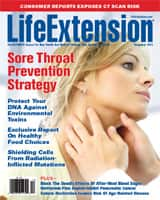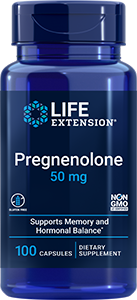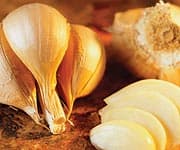|
|
|
Tuesday, December 15, 2015
A follow-up to a four year intervention that found a decrease in cardiovascular mortality among subjects given coenzyme Q10 (CoQ10) and selenium uncovered continued risk reduction among supplemented subjects compared to the placebo group over a ten year period.
The study included 443 older individuals who participated in a trial in which 222 subjects received a placebo and 221 subjects received 200 milligrams (mg) CoQ10 plus 200 micrograms (mcg) selenium for four years. The trial found less than half the risk of dying from cardiovascular disease among participants who received CoQ10 and selenium compared to those given a placebo.
The current investigation, which was reported on December 1, 2015 in the journal PLOS One, followed the trial's subjects for a ten year median. At the end of the follow-up period, there were 86 cardiovascular deaths among those who received a placebo and 46 among those who received CoQ10 and selenium—indicating a risk of cardiovascular mortality that was nearly half that of the placebo group. All-cause mortality after ten years was also lower among those supplemented with CoQ10 and selenium.
"Surprisingly, the 48-month intervention appears to be accompanied by durable cardiovascular protection after termination of the supplements," write Urban Alehagen of Sweden's Linköping University and colleagues. "From the analyses of subgroups it could be verified that patients with ischemic heart disease and/or diabetes had an increased cardiovascular risk, but they appeared to be equally protected by the active combined supplementation treatment."
Dr Alehagen and his associates observe that both selenium and CoQ10 defend the body against oxidative stress, which often accompanies inflammation. In addition to selenium-containing enzymes' antioxidant property, their anti-inflammatory and antithrombotic properties benefit the cardiovascular system. The authors note that selenium is necessary for the reduction of coenzyme Q10 to ubiquinol, the active form of the coenzyme. "A hypothesis that can be proposed from our results is that the intervention with selenium combined with coenzyme Q10 inhibits the pathogenesis of irreversible, presumably structural, changes preceding cardiovascular events," they conclude. |
|
|
| |
 |
|
What's Hot |
|
|
|
Subnormal selenium levels linked with increased mortality over 6.8 year period |
|
|
|
 |
|
| |
On June 24, 2015 the European Journal of Clinical Nutrition reported an association between decreased serum selenium levels and a greater risk of mortality in an older population over a period of 6.8 years.
"About half of the selenium in whole blood is found in the plasma, of which selenoprotein P (SEPP1) usually constitutes more than 60% and glutathione peroxidase constitutes 25%," U. Alehagen and colleagues write. "SEPP1 contains up to 10 selenocysteine residues and is the means of transporting selenium around the body to tissues that need it. It has an antioxidative role in the blood and, among other biological effects, it is believed to be active in endothelial protection."
The investigation included 449 older men and women who participated in an epidemiologic project in southeast Sweden. Serum selenium levels were measured upon enrollment in the current study and in 98 subjects after 48 months. Selenium levels averaged 67.1 micrograms per liter at the beginning of the study in January 2003.
Through February 2010 there were 122 deaths from all causes, including 85 that were attributable to cardiovascular disease. Among those whose selenium levels were among the lowest 25% of subjects, there was an adjusted 43% increase in the risk of dying from any cause and a 56% risk of cardiovascular mortality in comparison with the remainder of the study population.
"The mean serum selenium concentration in an elderly Swedish population was 67.1 micrograms/liter, which is below the physiological saturation level for several selenoprotein enzymes," the authors conclude. "This result may suggest the value of modest selenium supplementation in order to improve the health of the Swedish population."
|
|
|
| |
 |
|
Life Extension Clinical Research Update
Effects of Nutritional Supplements on Cognition, Mood, and Fatigue (CL078)
South Florida Location |
|
|
|
Life Extension is sponsoring a study to assess the effects of nutritional supplements in support of cognition, mood and fatigue in individuals with memory
complaints, an altered mood and/or feelings of fatigue within the past six months.
To qualify:
- Between 40-70 years of age
- Normal weight to overweight (BMI 18.5—29.9)
- In good health
- Experiencing memory complaints, an altered mood, and/or feelings of fatigue (within the past six months)
- Currently drinking no more than one cup of coffee a day
- Able to comply with all study procedures and visits
Qualified participants will receive:
- Study product
- Blood tests
- Blood pressure evaluations
- Up to $250 for time and travel expenses
- A $50 referral bonus is also available.*
Please call 1-866-517-4536 for further information and to see if you qualify.
*If you refer someone who enrolls in a study and completes their final visit with closeout procedures, you will be compensated the amount noted for the study.
https://www.lifeextension.com/clinicalresearch/ClinicalTrials.htm |
|
|
 |
|
Highlight |
|
| |
| — |
Life Extension Magazine® December 2015 Issue

On the cover
A novel probiotic to reduce the risk of strep throat, by Laurie Ezreich
Reports
Block deadly effects of after meal blood sugar, by Michael Downey
Cancer risks of CT scans, by Andrea Levy
Chlorophyllin protects against environmental toxins, by Edward R. Rosick, DO, MPH, DABIM
The 2015 American Society for Nutrition Conference, by Ben Best
Departments
As we see it: Consumer Reports discovers dangers of CT scans and X-rays, by William Faloon
In the news
Ask the doctor: Manage chronic pain with natural therapies, by Michael Downey
Wellness profile: Soccer superstar Michael Lahoud says vitamin D improved his stamina and his game, by Loretta Grantham
Superfoods: Walnuts, by Michael Downey
Journal abstracts: X R shield, chlorophyllin, benfotiamine and FlorAssist® Throat Health
| |
|
 |
|
Health Concern
Atherosclerosis and cardiovascular disease |
|
|
CoQ10 is critically important for vascular health, as it is directly involved in the production of ATP, the "energy currency" of the human body. Because the heart is a muscle that never rests, it needs a substantial amount of CoQ10. CoQ10 levels in heart tissue decline disproportionately with age. At age 20, the heart has a higher CoQ10 level than other major organs. At age 80 this is no longer true, with heart levels cut by more than half (Kalen, 1989). CoQ10 pioneer Karl Folkers (1985), in agreement with other Japanese studies, found lower CoQ10 levels in patients with more severe heart disease and showed that CoQ10 supplements significantly raised blood and heart tissue levels of CoQ10 in these patients.
In addition to its involvement in energy production, CoQ10 is also a potent antioxidant. CoQ10 is the first line of defense against LDL oxidation; oxidized LDL is a major contributor to endothelial dysfunction (Thomas, 1995).
CoQ10, in combination with vitamins C, E and selenium, was shown in a randomized controlled trial to significantly improve arterial elasticity in patients with multiple cardiovascular risk factors. The authors found that the antioxidant-induced increases in arterial elasticity were associated with improved glucose and lipid metabolism, as well as decreased blood pressure (Shargorodsky, 2010).
|
|
|
| |
 |
|
Latest Products |
|
|
 |
Pregnenolone, 50 mg, 100 capsules
Item #00302
|
Pregnenolone is biochemically a prohormone. It is made directly from cholesterol within the mitochondria of the adrenal glands and, to a lesser degree, the nervous system, with the help of the cholesterol side chain cleavage enzyme, p450scc. Pregnenolone is a precursor to various hormones, such as progesterone, mineralocorticoids, glucocorticoids, androgens, and estrogens. So it can help the body maintain normal hormone levels, which in turn helps numerous body functions. |
 |
Super K with Advanced K2 Complex, 90 softgels
Item #01834
|
Humans get most of their vitamin K from green vegetables in the form of vitamin K1. The problem is that K1 is tightly bound to plant fiber and only a small fraction absorbs into the bloodstream.
Vitamin K2 (menaquinones) is found in meat, eggs, and dairy products and is also made by bacteria in the human gut, which provides a certain amount of the human vitamin K requirement. Human studies show that vitamin K2 is up to ten times more bioavailable than K1. Vitamin K2 remains biologically active in the body far longer than K1. For instance, K1 is rapidly cleared by the liver within eight hours, whereas measurable levels of K2 (MK-7) have been detected 72 hours after ingestion. |
|
|
|
 |
|
Related Life Extension Magazine® Articles |
|
|
|
|
|
|







